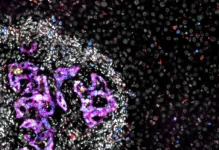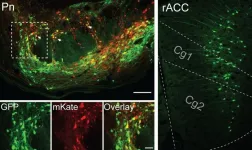(Press-News.org) Less than a decade ago, when Dr. Hansruedi Mathys launched an ambitious project to create an annotated library of all the gene readouts stored within 100 individual brain cells, the task felt daunting.
Now, with technological advances, Mathys successfully mapped out such ‘transcriptomes’ from not just 100, but from 1.3 million brain cortex cells from 48 individuals with and without Alzheimer’s disease.
Mathys, who pioneered single-cell transcriptomic analysis on post-mortem human brain tissue during his postdoctoral training and is now an assistant professor of neurobiology at the University of Pittsburgh School of Medicine, says that the resulting atlas of the aging human brain holds molecular insights into the brain’s vulnerability and resilience.
“I am extremely interested in understanding the phenomenon of cognitive resilience where, despite the characteristic signs of Alzheimer’s tissue pathology, individuals display no cognitive impairment,” Dr. Mathys said. “Our recent findings have made me more hopeful than ever that it might be possible to artificially induce such resilience in people who otherwise are susceptible to memory loss.”
In the study, published this week in Nature, Mathys and his colleagues at the Massachusetts Institute of Technology analyzed transcriptomes of cells across six distinct brain regions that are often affected by Alzheimer's pathology. The resulting atlas, which is now available online to researchers worldwide, could be used as a tool for gene and molecular discovery across pathways affecting brain health.
By tracking how transcriptomic changes are linked to cognitive decline and Alzheimer's pathology, Mathys and his colleagues discovered that astrocytes – one of the cell types that make up the brain tissue scaffold alongside maintaining a host of other crucial functions – could be holding a key to cognitive resilience. Mathys’ ongoing research, which resulted from the transcriptome mapping, aims to explore the functional significance of altering astrocyte metabolic pathways to affect cognitive function.
“There is still a lot to learn about Alzheimer’s disease and the human brain,” said Mathys. “This project is just the beginning.”
END
Building a molecular brain map to understand Alzheimer’s disease
2024-07-24
ELSE PRESS RELEASES FROM THIS DATE:
Trees reveal climate surprise – bark removes methane from the atmosphere
2024-07-24
Tree bark surfaces play an important role in removing methane gas from the atmosphere, according to a study published today (24 July) in Nature.
While trees have long been known to benefit climate by removing carbon dioxide from the atmosphere, this new research reveals a surprising additional climate benefit. Microbes hidden within tree bark can absorb methane – a powerful greenhouse gas – from the atmosphere.
An international team of researchers led by the University of Birmingham has shown for ...
Webb images nearest super-Jupiter, opening a new window to exoplanet research
2024-07-24
“We were excited when we realised we had imaged this new planet”, said Elisabeth Matthews, a researcher at the Max Planck Institute for Astronomy in Heidelberg, Germany. She is the main author of the underlying research article published in the journal Nature. “To our surprise, the bright spot that appeared in our MIRI images did not match the position we were expecting for the planet”, Matthews points out. “Previous studies had correctly identified a planet in this system but underestimated this super-Jupiter gas giant’s ...
Social vulnerability linked with mental health and substance use disorders
2024-07-24
A new study published in JAMA Psychiatry uncovers significant associations between social vulnerability — a measurement that aggregates social determinants of health like socioeconomic status, housing type, education and insurance coverage — and the prevalence and treatment of mental health and substance use disorders in the United States. The results have the potential to reshape public health policies to better serve systemically disadvantaged populations.
Powerful analysis of meaningful data
“We're continually learning that so much of healthcare — both mental health and physical health — is impacted by the environment ...
Insurance type and withdrawal of life-sustaining therapy in critically injured trauma patients
2024-07-24
About The Study: In this cohort study of U.S. adult trauma patients who were critically injured, patients who were uninsured underwent earlier withdrawal of life-sustaining therapy compared with those with private or Medicaid insurance. Based on the findings of this study, a patient’s ability to pay was likely associated with a shift in decision-making for withdrawal of life-sustaining therapy, suggesting the influence of socioeconomics on patient outcomes.
Corresponding Author: To contact the corresponding author, Graeme Hoit, M.D., email graeme.hoit@mail.utoronto.ca.
To ...
Physician posttraumatic stress disorder during COVID-19
2024-07-24
About The Study: The findings of this study suggest that physicians were more likely to experience posttraumatic stress disorder (PTSD) during the COVID-19 pandemic. Targeted interventions to support physician well-being during traumatic events like pandemics are required.
Corresponding Author: To contact the corresponding author, Manish M. Sood, M.D., email Msood@toh.on.ca.
To access the embargoed study: Visit our For The Media website at this link https://media.jamanetwork.com/
(doi:10.1001/jamanetworkopen.2024.23316)
Editor’s ...
Social isolation changes and long-term outcomes among older adults
2024-07-24
About The Study: Increased isolation was associated with elevated risks of mortality, disability, and dementia, irrespective of baseline isolation status in this cohort study. These results underscore the importance of interventions targeting the prevention of increased isolation among older adults to mitigate its adverse effects on mortality, as well as physical and cognitive function decline.
Corresponding Author: To contact the corresponding author, Judy Zhong, Ph.D., email judy.zhong@nyumc.org.
To access the embargoed study: Visit our For The Media website at ...
Under pressure: how cells respond to physical stress
2024-07-24
Cell membranes play a crucial role in maintaining the integrity and functionality of cells. However, the mechanisms by which they perform these roles are not yet fully understood. Scientists from the University of Geneva (UNIGE), in collaboration with the Institut de biologie structurale de Grenoble (IBS) and the University of Fribourg (UNIFR), have used cryo-electron microscopy to observe how lipids and proteins at the plasma membrane interact and react to mechanical stress. This work shows that, depending on conditions, small membrane regions can stabilize ...
Preventing cancer cells from colonizing the liver
2024-07-24
In brief:
ETH Zurich researchers have discovered proteins on the surface of colorectal cancer cells and liver cells that bind together and that play a major role in the formation of new metastases.
The binding of the proteins triggers fundamental changes in colorectal cancer cells that allow them to take root in the liver.
These new findings will help to develop future treatments that may hinder the formation of often fatal metastases.
In cases where cancer is fatal, nine out of ten times the culprit is metastasis. This is when the primary tumour has sent out cells, like seeds, and invaded other organs of the body. While medicine has made great progress in treating primary tumours, ...
Neuroscientists discover brain circuitry of placebo effect for pain relief
2024-07-24
CHAPEL HILL, NC – The placebo effect is very real. This we’ve known for decades, as seen in real-life observations and the best double-blinded randomized clinical trials researchers have devised for many diseases and conditions, especially pain. And yet, how and why the placebo effect occurs has remained a mystery. Now, neuroscientists have discovered a key piece of the placebo effect puzzle.
Publishing in Nature, researchers at the University of North Carolina School of Medicine– with colleagues from Stanford, the Howard Hughes Medical Institute, and ...
'Gene misbehavior' widespread in healthy people
2024-07-24
Scientists have uncovered that ‘gene misbehaviour’ – where genes are active when they were expected to be switched off – is a surprisingly common phenomenon in the healthy human population.
The team also identify several mechanisms behind these gene activity errors. This may help inform precision medicine approaches and enable the development of targeted therapies to correct expression.
Researchers from the Wellcome Sanger Institute, the University of Cambridge and AstraZeneca studied the activity of inactive genes in a large, healthy population for the first time. While rare at the individual gene level, they revealed misexpression ...





